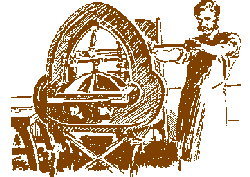 | My father, Mark Twain By Madame Clara Clemens Gabrilowitsch |
 | My father, Mark Twain By Madame Clara Clemens Gabrilowitsch |
It was always impossible for me to regard my father as a private person - to think of him as just my father or my mother's husband. I felt about him as I imagine a traveler feels about the Sphinx, whose very shadow pictures boundless night, and holds its own in immense areas of piled up masses of sand. One cannot easily say how impressions of greatness creep into the mind of a small child, marking one of its daily companions with an insignia that awes or perplexes. Many an evening my father told my sister and me impromptu stories inspired by objects in the room or pictures on the wall; he also played with our kittens, and loved them as much as we did. Often, too, he played charades with us, and private theatricals, or took us on long walks. Yet rarely did I lose the feeling with my father that I was in the presence of royalty. Being very shy and noncommunicative myself as a child, I used to marvel at my father's ability to sit at the table and pour out an uninterrupted flow of words expressing his feelings on matters intimately connected with himself, in the presence often of comparative strangers, who were wide-eyed with interest and surprise. Yet this was but one side of medal, for he could be forbiddingly reserved and locked away from the most vivacious attempts of visitors to enter his personality ever so tiny a distance. He was a constant surprise in his varied moods, which dropped unheralded upon him, creating day or night for those about him by his twinkling eyes or his clouded brows. How he would be affected by this or that no one could ever foresee.Not having much knowledge of squirrels, my parents had permitted me to keep two in a small room on the third floor of our home in Hartford. Soon after their arrival these animals began to gnaw the woodwork, until it looked as if the walls would fall in. The maid who was supposed to take care of that room found so little pleasure in doing it that I doubted whether she ever did more than flick her dustcloth at the squirrels and run away. This was a great comfort to me, for I was certain that if it were discovered how faithfully the squirrels-were gnawing away the house I should have to bid them farewell. My father's billiard-room was on the same floor, but as that was were he worked I felt no-danger from that quarter. My mother was not likely to climb so many stairs, and my sister was afraid of squirrels, so I had just begun to feel safe with my secret when one morning I heard with trembling my father's footsteps approaching my room. The door was pulled open, and at that moment one of the squirrels jumped onto my shoulder. My father stood in the doorway; and his keen eyes rapidly took in the scene. The squirrel seemed no protection to me, although his bushy tail covered half my cheek. I would have declared that my father stared at us for two or three minutes, then he said:
"Aren't you afraid of him?"
"No," I answered: "he only gnaws wood."
This seemed to strike my father as funny, and he laughed heartily.
"Do you like those squirrels?" he asked.
I answered a timid "yes," now fearing that their lot was cast.
My father, however, then. stamped himself a snap of heart in my small mind, for he said with that crystal twinkle in his eye:
"If I were you then, I would not tell on them."
In many ways he remained a boy to the year of his death. With the keenness of youth his responsive nature boomed and blossomed with each fresh cause. The contemplation of injustice in the world, whether from individual toward individual or country toward country, gradually modified his capacity to enjoy the bright side of life, and more and more he fell to brooding until his voice came to be "a wail for the world's wrong."
Nothing could make his face light up with greater pleasure than the sight of a kitten, or call out greater tenderness from his loving nature. If I stepped into his study where he was at work, and barely discernible through a cloud of smoke, he would look up and say in a sweet half-absent tone: "What do you wish, dear?"
If I carried a kitten in my arms, the dreamy look would disappear from his eyes, and he would drop any work to nestle the soft ball of fur in his neck. We children were not supposed to disturb him at work, but if for any reason we were forced to I thought it expedient to be accompanied by a kitten.
On a visit to my father's birthplace this year I was much moved in noting the kind of worship the good people of that place give to every thought he expressed. Should his memory be neglected anywhere in the world it will not be Florida, Missouri. The simplicity of the town and Its surroundings constitutes a world of its own - and one in which I can more easily imagine the birth of a genius than in the rapids of a large city. A very old man in the village played a tune for me on a wood-saw, and a lucid, melodious tune it was, coming from the strange instrument. The concert took place in the one department store of the village, where all the inhabitants had congregated to warm themselves by the large stove, it being freezing weather that day. I could easily imagine my father in this circle of warm-hearted, vivacious country people, and could hear him exchanging anecdotes or tunes on the wood-saw. For, just as he loved to play with his children and their kittens, so would he have spent boyish hours with the friends of his birthtown, merging his personality with theirs, and winning the title of comrade as well as prince among men.
Editor's Note: This story is reprinted from the May 1924 issue of THE MENTOR magazine, an issue dedicated to Mark Twain.
| News || Guest Writers || Mark Twain || Dan DeQuille || Humor || Travel |
 A NATIONAL HISTORIC TREASURE Publishing Since 1858 |  © 1999 All Rights Reserved |